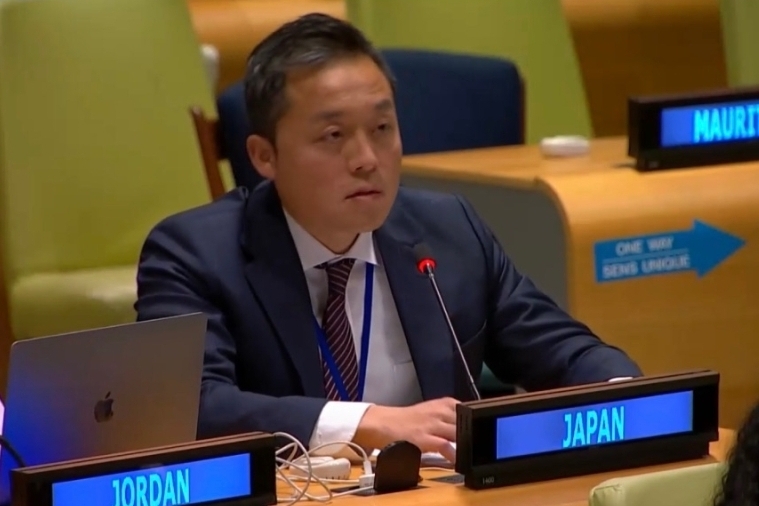第78回国連総会第6委員会「法の支配」(議題83)における長野参事官ステートメント
令和5年10月18日

Thank you, Chair.
Japan aligns with Austria’s statement on behalf of the Group of Friends of the Rule of Law. It is obvious that the promotion of the rule of law is a prerequisite for sustainable development as well as the maintenance of peace and security both at the national and international levels. While Japan has attached high importance to assisting the development of countries in need and will continue our proactive support for promoting the rule of law at the national level, let me speak more about actions that should be taken at the international level today.
The prohibition of threat or use of force under Article 2(4) of the Charter of the United Nations constitutes the most fundamental rule of the post-war regime for peace based on the rule of law among nations. It is based on this conviction that Prime Minister Kishida elaborated the basic principles on the rule of law last year at the UN General Assembly. In the same vein, in January 2023, then Foreign Minister Hayashi chaired the ministerial level open debate of the UN Security Council on the theme of “Rule of Law among Nations".
Prime Minister Kishida underlined the following basic principles.
- First, the observance of international law in good faith. We should refrain from abusing the principles of international law.
- Second, the prohibition of any attempts to acquire territory by force. Any attempt to change the status quo by force, create fait accompli, and acquire territory must not be allowed.
- Third, the duty of UN Member States to cooperate against violations of principles of the Charter.
This year, as the G7 President, Japan has also put the rule of law high on the agenda. The G7 Foreign Ministers Communiqué and G7 Leaders’ Communiqué both declared opposition to the acquisition of territory by force, upholding the international order based on the rule of law. In Hiroshima, the G7 and leaders from countries often referred to as the Global South shared the importance of upholding the free and open international order based on the rule of law. Based on these discussions, at this year’s General Debate, Prime Minister Kishida reaffirmed our commitment to protect the right of vulnerable nations and peoples to live in peace under the rule of law, in order to safeguard the most fundamental need: 'human dignity'.
Mr. Chair,
Russia’s aggression against Ukraine has revealed the ineffectiveness of the Security Council to fulfill its primary responsibility for the maintenance of international peace and security. In order to prevent similar situations in the future, UN Member States should have deeper discussion on more effective utilization of existing rules and mechanisms available under the Charter. Today I would like to briefly flag two general ideas:
- First, I would like to emphasize the importance of cooperation among Member States against serious violations of the UN Charter, in particular, aggression. Japan believes that UN Member States have a duty to cooperate as agreed in the 1970 Friendly Relations Declaration. This duty to cooperate does not impose obligation beyond each Member State’s capacity. However, it imposes obligation upon Member States to refrain from supporting aggression and to make effort to stop the aggression within their respective capacities.
- Second, in order to uphold the principles of the UN Charter, Member States should consider how we can enhance the role of the International Court of Justice (ICJ). Currently only 74 States have made a declaration under Article 36(2) of the ICJ Statute, and we have been calling for Member States who have not yet done so to make this declaration. Even in the absence of such declaration, the Security Council may recommend appropriate procedures or methods of adjustment, including the utilization of the ICJ, in accordance with Article 36 of the UN Charter. In this context, it should also be recalled that Article 27(3) of the Charter stipulates that a party to a dispute shall abstain from voting in Council decisions in the context of pacific settlement of disputes.
I would like to conclude my remarks by recalling that Japan has been making efforts in reinforcing international judicial institutions such as the ICJ, the International Tribunal for the Law of the Sea (ITLOS), and the International Criminal Court (ICC). Japan has been providing both human and financial resources and will continue to do so. Japan also spares no effort in partnering with the ICC to promote the universality of the Rome Statute. Japan will continue to cooperate with fellow Member States of the United Nations towards the realization of the rule of law among nations based on the UN Charter.
Thank you.
